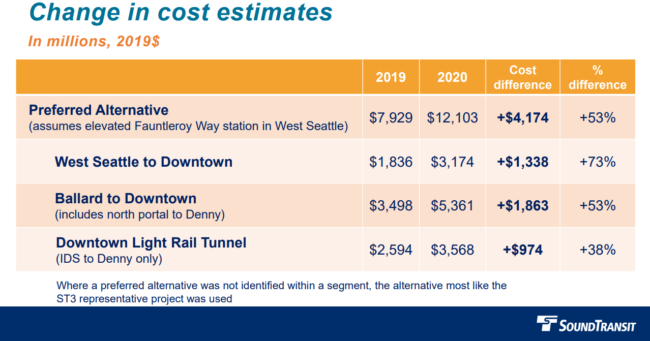Sound Transit committee gets a closer look at West Seattle & Ballard cost increases

Sound Transit's System Expansion Committee heard a deeper dive on the recent increase in costs for Seattle Link projects at their meeting Thursday. A long list of revisions to property costs and construction plans contributed to a more than $4 billion increase in the overall cost of the project just since last year.
The incremental cost of tunnel alternatives, however, are now much closer to elevated alternatives, though only because the representative elevated alternatives are so much more expensive. Board members gave no hint of how they would respond to the affordability gap on the project, though there was enthusiasm for adding tunnels as they would not make the needed delays so much greater.
In 2019 dollar terms, the West Seattle-Ballard Link Extension (WSBLE) had an estimated capital cost of $7.1 billion in the ST3 plan. By 2019, that had been revised upwards to $7.9 billion, reflecting some mix of the preferred alternative choices made by the Board and underlying inflation in costs. The most recent estimates, with the benefit of more detailed investigation since the Board selected preferred alternatives for the EIS, raises this to a range of $12.1 billion to $12.6 billion. The lower number is for an elevated Fauntleroy terminus in West Seattle, the higher for an elevated station on 41st/42nd in West Seattle.
The largest cost increase at $2.1 billion is in right of way. There are at least three elements to the increase in right-of-way costs. There's a general inflation of property costs, which is higher than typical consumer inflation. That seems the major element of the cost increases from 2015 through 2019, and a significant contributor to the larger increase in the 2020 estimate. Sound Transit annually adjusts its estimates as the baseline increases, but expects a normal 6.5% appreciation in future as per historic averages. Any single year might be very different, but a typical recession would reduce property prices offsetting increases during growth years. The unusual 2020 recession was remarkable in that it didn't slow the rate of property price increases at all.
Second, there's the amount of property to be acquired, which appears to have been under-estimated in many places. The general conceptual models estimate an envelope around the likely alignment. Depending on the type of project element, this envelope runs 55' to 90'. For a variety of reasons, including more robust construction in some places, the typical property need is running well ahead of the envelope assumptions requiring a greater amount of property acquisition.
Third, there is new development along the corridor, which can dramatically increase the cost of some parcels. The oft-highlighted example of a strip mall on Fauntleroy that is being replaced by an apartment building while it also serves as the representative location for an elevated station is just one instance.
Construction costs have added nearly $1.3 billion to the estimates this year. There are a very long list of issues identified, probably none individually very important. Early design has added $480 million, mostly for additional excavation, larger foundations, longer station boxes in the downtown tunnel, and longer spans on the water crossings. There's an added $275 million in station requirements, $240 million in higher costs identified through early utilities investigation, and $230 in environmental mitigation and impacts to other transit.
The construction cost estimates in the ST3 plan seem to have simply been too sunny. Construction cost increases of all types appear all along the corridor. Conceptual estimates are, by their nature, not likely to be precisely accurate, but all the errors appear to have been in the same direction with no positive surprises of note anywhere.
Mechanically, the soft costs and contingencies increase as the other items increase because they are estimated as percentages of those other items. As the right of way and design costs are pushed upwards, that is estimated to add $1.05 to $1.4 billion to contingencies and soft costs.
Even on the lower cost Fauntleroy alignment, the net effect is a 73% increase in West Seattle costs, vs +53% on the Ballard-Denny segment and +38% downtown. In dollar terms, however, Ballard contributes the most to the change in estimates (+$1.9 B in Ballard vs +$1.3 billion in West Seattle and + $1.0 billion downtown).
It's not clear what direction this offers for the Board in deciding how to respond. The obvious cost-saving path is to delay one or both ends of the line with a truncated starter line.
The arguable bright spot in Thursday's briefing is that the cost gap between elevated and tunnel options in Ballard and West Seattle has narrowed greatly. In Ballard, either an elevated or tunneled alignment to a 14th Ave station has the same $1.6 billion price tag between Interbay and the Ballard terminus. A tunnel to a 15th Ave station is just $150 million more at $1.75 billion.
In West Seattle, the range is wider, though still narrowed vs earlier estimates. The elevated options are $1.6 billion (Fauntleroy) or $2.0 billion (41st/42nd Ave) through the West Seattle Junction and Delridge segments. Tunnel options on 41st or 42nd are $2.1 to $2.2 billion. That leaves an elevated station on Fauntleroy as the clear winner on cost, but with all the other options closely bunched together. Both Dow Constantine and Jenny Durkan have clearly signaled their preference for the tunnel options in recent meetings. Sound Transit expects Seattle to pick up the incremental cost of a tunnel over an elevated alignment if tunnels are selected.
A board workshop on January 21 will consider how the cost changes affect the ST3 realignment discussions with a revised timeline and scope for future projects expected this summer.